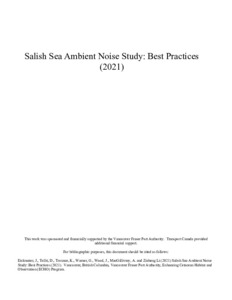| dc.contributor.author | Eickmeier, Justin | |
| dc.contributor.author | Tollit, Dominic | |
| dc.contributor.author | Trounce, Krista | |
| dc.contributor.author | Warner, Graham | |
| dc.contributor.author | Wood, Jason | |
| dc.contributor.author | MacGillivray, Alex | |
| dc.contributor.author | Li, Zizheng | |
| dc.coverage.spatial | Salish Sea | |
| dc.date.accessioned | 2021-05-18T13:28:31Z | |
| dc.date.available | 2021-05-18T13:28:31Z | |
| dc.date.issued | 2021 | |
| dc.identifier.citation | Eickmeier, J., Tollit, D., Trounce, K., Warner, G., Wood, J., MacGillivray, A. and Zizheng Li (2021) Salish Sea Ambient Noise Study: Best Practices (2021). Vancouver, British Columbia, Vancouver Fraser Port Authority, Enhancing Cetacean Habitat and Observation (ECHO) Program, 50pp. DOI: http://dx.doi.org/10.25607/OBP-1068 | en_US |
| dc.identifier.uri | http://hdl.handle.net/11329/1572 | |
| dc.identifier.uri | http://dx.doi.org/10.25607/OBP-1068 | |
| dc.description.abstract | All monitoring locations and hydrophone systems have unique features that affect the ability to monitor ambient noise levels accurately. As anthropogenic underwater noise effects on marine species becomes increasing important globally, it is imperative to understand how best to consistently measure, analyze, and account for factors contributing to the soundscape. The Enhancing Cetacean Habitat and Observation Program, led by the Vancouver Fraser Port Authority, seeks to mitigate shipping noise effects on at-risk whales, particularly endangered Southern Resident Killer Whales. Utilizing two years of data from three different, cabled inshore hydrophone stations in the Salish Sea, this high-level review aims to help understand and address key environmental and anthropogenic factors that contribute to ambient noise. Contributions from: the hydrophone system and ancillary equipment; rain, wind and tidal currents; factors affecting sound propagation; biological presence; and vessel traffic are considered in this study, and “best practice” recommendations for undertaking standardized long-term noise assessment are provided. Key findings highlight that early and frequent quality assessment protocols are imperative, weather and tidal information should be collected proximate to the hydrophone, vessel traffic was the dominating influence at all locations across all measured frequencies, and validated noise models should augment empirical data collection. Monthly variability in sound pressure levels was 2-6 dB, highlighting the analytical challenges in determining “existing” conditions and detecting trends or testing mitigation strategies. Accounting for the key factors contributing to the soundscape is considered critical in these evaluations. | en_US |
| dc.description.sponsorship | This work was sponsored and financially supported by the Vancouver Fraser Port Authority. Transport Canada provided additional financial support. | en_US |
| dc.language.iso | en | en_US |
| dc.publisher | Vancouver Fraser Port Authority, Enhancing Cetacean Habitat and Observation (ECHO) Program | en_US |
| dc.rights | Attribution-NonCommercial-NoDerivatives 4.0 International | * |
| dc.rights.uri | http://creativecommons.org/licenses/by-nc-nd/4.0/ | * |
| dc.subject.other | Sound pressure | en_US |
| dc.subject.other | Ambient noise | en_US |
| dc.subject.other | Sound fields | en_US |
| dc.subject.other | Soundscape | en_US |
| dc.subject.other | Source levels | en_US |
| dc.subject.other | Metocean data | en_US |
| dc.subject.other | Sound speed profiles | en_US |
| dc.subject.other | Ocean currents | en_US |
| dc.subject.other | Receivers | en_US |
| dc.subject.other | Cetaceans | |
| dc.subject.other | Whales | |
| dc.subject.other | Noise effects | |
| dc.title | Salish Sea Ambient Noise Study: Best Practices. (2021). | en_US |
| dc.type | Report | en_US |
| dc.description.status | Unpublished | en_US |
| dc.format.pages | 50pp | en_US |
| dc.contributor.corpauthor | Enhancing Cetacean Habitat and Observation (ECHO) Program | en_US |
| dc.description.refereed | Non Refereed | en_US |
| dc.publisher.place | Vancouver, Canada | en_US |
| dc.subject.parameterDiscipline | Parameter Discipline::Physical oceanography::Acoustics | en_US |
| dc.subject.instrumentType | Instrument Type Vocabulary::hydrophones | en_US |
| dc.subject.dmProcesses | Data Management Practices::Data acquisition | en_US |
| dc.subject.dmProcesses | Data Management Practices::Data processing | en_US |
| dc.subject.dmProcesses | Data Management Practices::Data quality control | en_US |
| dc.description.currentstatus | Current | en_US |
| dc.date.review | 2022-05-17 | |
| dc.description.sdg | 14.A | en_US |
| dc.description.eov | Ocean Sound | en_US |
| dc.description.maturitylevel | TRL 5 System/subsystem/component validation in relevant environment | en_US |
| dc.description.bptype | Best Practice | en_US |
| dc.description.bptype | Standard Operating Procedure | |
| obps.contact.contactname | Justin Eickmeier | |
| obps.contact.contactemail | jeickmeier@slrconsulting.com | |
| obps.resourceurl.publisher | https://www.portvancouver.com/environmental-protection-at-the-port-of-vancouver/maintaining-healthy-ecosystems-throughout-our-jurisdiction/echo-program/ | en_US |
 Repository of community practices in Ocean Research, Applications and Data/Information Management
Repository of community practices in Ocean Research, Applications and Data/Information Management

